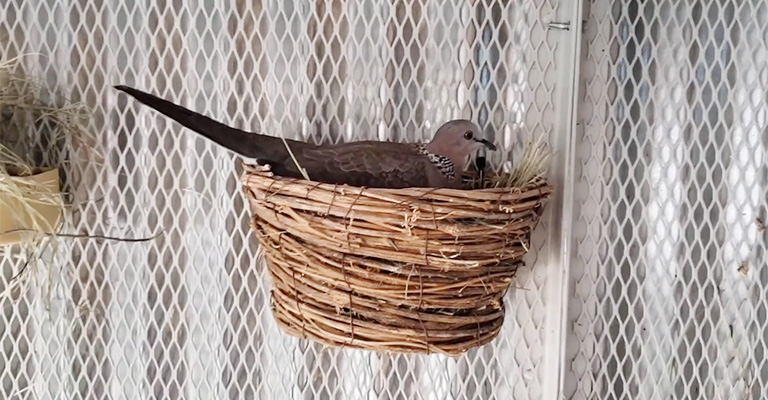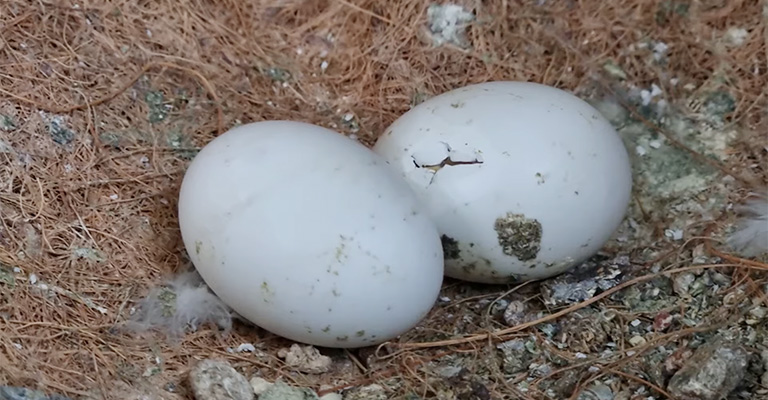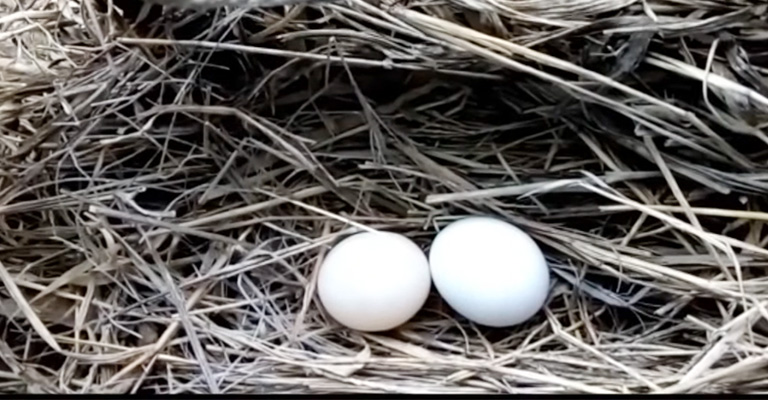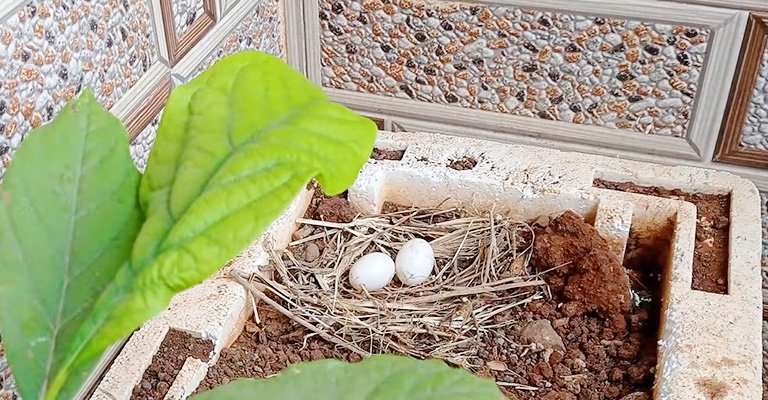The delicate and fascinating process of avian reproduction brings forth new life, captivating observers with its remarkable journey. However, in nature, not every egg will successfully hatch, including those of doves.
When dove eggs fail to hatch, it can be a disheartening experience for both the birds and the observers. So, what happens if dove eggs don’t hatch? Unhatched dove eggs don’t produce any hatchlings. Infertility, extreme temperature, and lack of nursing are the common factors affecting egg hatching.
Let’s explore the various factors that contribute to non-hatching dove eggs and examine the implications of this phenomenon.
![What Happens If Dove Eggs Don't Hatch? [Understanding the Non-Hatching of Dove Eggs]](https://theworldsrarestbirds.com/wp-content/uploads/2023/06/What-Happens-If-Dove-Eggs-Dont-Hatch-Understanding-the-Non-Hatching-of-Dove-Eggs.jpg)
How Long Does Dove Egg Take to Hatch?
Several factors can influence the hatching time of dove eggs. Some of the key factors include:
Temperature
The temperature at which the eggs are incubated plays a significant role in determining the hatching time. Warmer temperatures generally accelerate the development of the embryos, resulting in shorter incubation periods.
Species of Dove
Different species of doves may have slight variations in their incubation periods. For example, Mourning doves typically have an incubation period of around 14 days, while other species may have slightly longer or shorter durations.
Environmental Conditions

The overall environmental conditions, such as humidity and air quality, can affect the hatching time. Optimal conditions provide a suitable environment for the eggs to develop and hatch within the expected timeframe.
Nesting Behavior
The nesting behavior of doves can influence the incubation period. Doves take turns incubating the eggs, and the duration each parent spends in the nest can impact the overall development of the embryos.
Egg Fertility
The fertility of the eggs can affect their viability and subsequent hatching time. Healthy, fertile eggs are more likely to develop normally and hatch within the expected timeframe.
It’s important to note that while these factors can influence hatching time, the specific conditions and circumstances can vary for different dove species and individual nests.
What Factors Affect Dove Egg Hatching?

Dove eggs are delicate and precious, representing the potential for new life and the continuation of a species. However, not all dove eggs will successfully hatch into healthy chicks.
There can be various reasons behind this unfortunate outcome, including-
Infertility
One of the primary reasons for eggs not hatching is infertility. If a male dove is not capable of fertilizing the female’s eggs, they will not develop into chicks.
Poor Incubation
As you might know, incubation plays a crucial role in the hatching process. If the eggs are not properly incubated, either due to incorrect temperature or humidity levels, the embryos may not develop or survive.
Genetic Abnormalities

Sometimes, genetic abnormalities can prevent the development of embryos, leading to unhatched eggs. These abnormalities may be inherited or arise spontaneously.
Predation or Disturbance
Nest predation by other animals or disturbance caused by humans can result in the abandonment of eggs by adult doves, leading to unsuccessful hatching.
Disease or Parasites
Certain diseases or parasite infestations can affect the viability of dove eggs. These conditions may interfere with embryonic development and prevent successful hatching.
Environmental Factors
Extreme weather conditions, such as excessive heat or cold, can negatively impact the incubation process and the viability of the eggs.
Nutritional Deficiencies
Inadequate nutrition during the breeding period can result in poorly developed eggs or weak embryos, leading to unsuccessful hatching.
How to Make Dove Eggs Hatch?

While not all unhatched dove eggs can be saved, there are some measures you can take to increase the chances of successful hatching. Proper handling of the eggs might result in a healthy hatchling. Below are the steps you can take to make a dove egg hatch-
Provide Optimal Nesting Conditions
Ensure that the nest is located in a safe and protected area, away from potential disturbances. Maintain suitable temperature and humidity levels for incubation.
Monitor Incubation
Keep a close eye on the nest and monitor the incubation process. Make sure the eggs are being consistently warmed by the parent doves.
Minimize Disturbance
Avoid unnecessary disturbance around the nesting area, as this can cause stress to the adult doves and potentially lead to the abandonment of the eggs.
Address Nutritional Needs
Provide a well-balanced diet to the adult doves, ensuring they receive all the necessary nutrients for healthy egg production and embryo development.
Seek Veterinary Assistance
If you suspect any health issues or abnormalities in the eggs, consult an avian veterinarian for guidance and appropriate treatment.
Practice Patience
Hatching can take time, and not all eggs will hatch simultaneously. Give the process ample time before concluding that the eggs are not suitable for hatching.
What to Do with Unhatched Dove Eggs?
If you have unhatched dove eggs, here are a few options to consider:
Observe and Learn
Keep the eggs in a safe place and monitor them closely. You may learn valuable information about the hatching process and gain insights for future breeding attempts.
Dispose of Them
When the eggs are clearly nonviable and have been abandoned by the adult doves, it may be best to dispose of them. Properly discard the eggs to prevent any potential health risks.
Egg Donation
In case you have a network of fellow bird enthusiasts or local bird sanctuaries, you might consider donating the unhatched eggs for educational purposes or to be used for research.
Incubation Experimentation
If you have access to appropriate equipment and expertise, you can attempt to artificially incubate the unhatched eggs to learn more about the process and potentially achieve successful hatching.
FAQs
Yes, candling can be used to check the viability of dove eggs. By shining a bright light through the egg in a dark room, you can see the embryo’s development.
If a dove abandons its eggs, it is unlikely they will hatch. In such cases, it is best to remove the eggs and dispose of them properly.
It is generally not recommended to move dove eggs to a different nest. The parent doves may reject the eggs if they sense any disturbance or unfamiliar scent.
Doves can breed multiple times throughout the year, with some species producing several broods annually under suitable conditions.
Final Thoughts
Now you know what happens if dove eggs don’t hatch. The hatching of dove eggs is a natural wonder that fills us with joy and excitement. However, various factors can contribute to this outcome and lead to unsuccessful hatching.
By understanding the reasons behind unsuccessful hatching, implementing appropriate care and environmental conditions, and seeking professional help when necessary, we can increase the chances of successful dove egg hatching.
Remember to always prioritize the health and well-being of the doves in your care. Be sure to appreciate the beauty of nature’s cycle, even when faced with unhatched eggs.